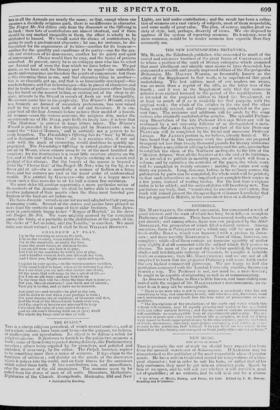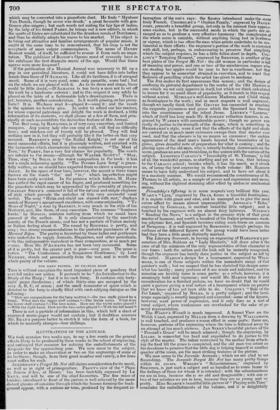NEW MUSIC.
THE ;MUSICAL BIJOU.* THIS is precisely the sort of work we should have expected to issue from the musical storehouse of Soho-square. D'ALssAiNE may be characterized as the publisher of the most respectable class of popular music. He has a certain traditional regard for compositions of a'clas- sical character ; but in order to suit his taste, or rather that of his lady customers, they must be put into an attractive garb. Speak to him of an opera, and he will ask you whether it \sill furnish a gcod set of quadrilles ; of an oratorio, and lie will look out for a chorus
* An Album of Music. poetry, and Prose, for 1530. Edited by F. H. Burney. Goulding and D'Almaine.
which may be converted into a pianoforte duet., He Inds" Mynheer Van Dunck, though he never was drunk," a great favourite with gen- tlemen glee-singers ; but such words not suiting the fair lips of ladies,
by the help of his friend PARRY, he brings out a new edition, in which the sports of fairies are substituted for the drunken revels of Dutchmen ;
and thus he skilfully adapts his wares to his market. If his object is to bring out attractive and familiar arrangements of popular music, it ought at the same time to be remembered, that his shop is not the
receptacle of mere vulgar commonplaces. The name of HENRY BISHOP would, of itself, be sufficient to rescue it from such an impu- tation. The publisher of BisuoP's Operas must of necessity have in his catalogue the first dramatic music, of the age. Would that those operas were more frequent ! If the publication of a Musical Annual was necessary to fill up a gap in our periodical literature, it could not have fallen into better hands than those of D'AnsiaiNE. Like all its brethren, it is of unequal merit. Some of it is very ''good, some only passable, some bad ; but on the whole we are pleased with it. As to its dress and shape, there could be little doubt,—D'AnmaiNE is too tasty a man not to .set off his work by a handsome exterior : and in this respect it may safely be placed on the table of a fashionable lady's drawingroom. There is yet, however, another consideration. Is it worth placing,. on her piano- forte? It is. We have read it—played it—sung it : and the result is the opinion we hereby give. In order to afford our fair readers, for whose especial patronage and delight the work is destined, a little information of its contents, we shall glance at a few of them, and prin- cipally at such as constitute the distinctive feature of this Annual. The first song, by RAWLINGS, is of very easy execution, and limited compass. Any young lady who can sing at all, will find no difficulty here ; and nineteen out of twenty will be pleased. They will find nothing new in it, but they will probably like it the better on that very account. BARNETT'S song "the :Exiled Knight," is not one of his most successful efforts, but it is pleasingly written, and enriched with the harmonies which characterize his compositions. "The Maid of Toro," by PARRY, has a very fair chance for popularity. The words are inferior to the music—although Sir WALTER SCOTT'S! "Stay, Tune, stay," by Sous, is the worst composition in the book : it has not a single redeeming quality. "The Persian Love Song" is grace- fully written, as we should have expected from so clever a composer as JOLLY. In the space of four bars, however, the accent is three times thrown on the words "the" and "in ;" which imperfection might have been easily avoided. In the polacca which follows, M. HERZ has curbed the rapid career of his finger, and produced something for the pianoforte which may be approached by the generality of players. CHARLES SMITH'S canzonet is full of the natural and simple elegance of style which pervade the melodies of this very successful vocal writer. The song "Helm and shield are stained with rest," displays much of BISHOP'S accustomed excellence, with some originality. "Ye Stars of Night," a doet by BARNETT, is very much in the style of .his Notturni, and, like them, of easy execution. The romance " Sombres forets," by Rossisa, contains nothing from which we could have guessed at the author. It is only characterized by the mawkish inanity of the French music, and has not a particle of Italian melody or Italian feeling about it. The round by RODWELL is pretty, and easy ; two strong recommendations to the probable purchasers of the Musical Bijou. The poetry is furnished by those ladies and gentlemen who undertake to supply Annuals, Magazines, and other periodicals, vf ii this indispensable ingredient in their composition, at so much per saiiza. Here Mr. D'ALMAINE has not been very successful. Some of it is pretty, but the greater part is poor—very poor. The prose is better. "The Confessions of ,a Suspicious Gentleman," by Lord NUGENT, stands out preeminently from the rest, and is worth the whole poetry of the volume.
THE HARP PRIMER. BY CHARLES EGAN
THIS is without exception the most impudent piece of quackery that ever fell under our notice. It pretends to be "An Introduction to the Study of the Harp ;" but it is no such thing. It contains only forty- eight pages duodecimo ; of which thirty-nine are occupied by the very A, B, C, of music ; and the small remainder of space which is devoted to the harp is chiefly filled with such edifying dialogue as the following : "110w are compositions for the harp written ?—On two staffs joined by a brace. What does the upper staff contain ?—The treble notes. What does the lower staff contain ?—The bass notes. How are the treble notes played ? —With the right hand. How are the bass notes played ?—With the left hand!, There is not a particle of information in this, which half a sheet of engraved music-paper would not contain ; but it doubtless answers Mr. EGAN'S purpose better to stretch it into the form of a book, for which he modestly charges—four shillings.



















 Previous page
Previous page